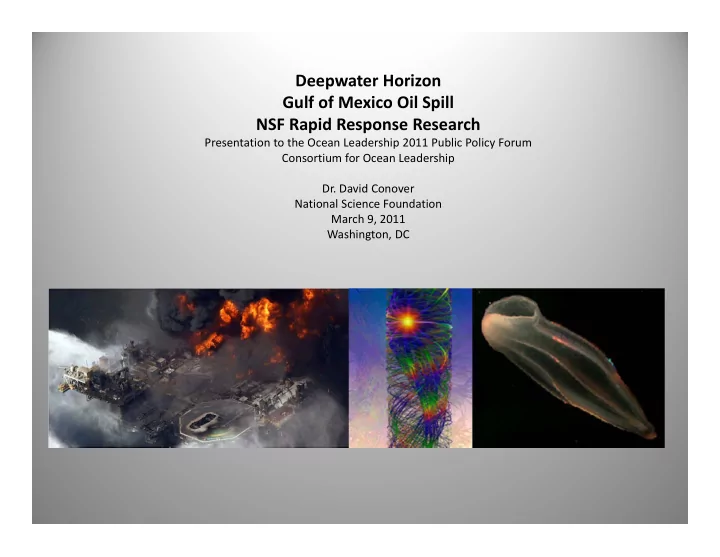

Deepwater Horizon Gulf of Mexico Oil Spill NSF Rapid Response Research Presentation to the Ocean Leadership 2011 Public Policy Forum Consortium for Ocean Leadership Dr. David Conover National Science Foundation March 9, 2011 Washington, DC 1
Rapid Research Program 2
NSF Rapid Response Research Efforts – Summary Total Awarded: $19,927,128 Total Number of NSF Awards: 171 Total Ship Costs: >$5,000,000 3
Division of Ocean Sciences Deepwater Horizon Rapid Response Research • Estimated Number of requests: 443 • Total Number of OCE NSF Awards: 64 • Total Amount Awarded: $7,318,064 • Average award processing time in OCE: 11.3 days • Average award processing time at NSF: 27.8 days 4
GEO Directorate Rapid Response Research OCE $7,318,064 Other NSF Directorates $11,234,149 EAR $919,138 AGS $455,777 Total Amount Awarded per Division in GEO Total Amount in GEO: $8.6m 5
NSF Ship Rapid Response Research Effort Atlantis Pelican Atlantis Atlantis Pelican Oceanus Cape Hatteras Cape Hatteras Endeavor Cape Hatteras Endeavor Cape Hatteras Walton Smith Pelican 30 ‐ Apr 31 ‐ May 1 ‐ Jul 1 ‐ Aug 1 ‐ Sep 2 ‐ Oct 2 ‐ Nov 3 ‐ Dec Total NSF Ship Days – 224 Cruise dates R/V Pelican ‐ 12 R/V Cape Hatteras ‐ 61 R/V Walton Smith ‐ 22 R/V Endeavor ‐ 34 R/ Oceanus ‐ 46 6 R/V Atlantis ‐ 49
7
Publications from Rapid Response Research – OCE Awards August 19, 2010 (online). R. Camilli et al., Tracking Hydrocarbon Plume Transport and Biodegradation at Deepwater Horizon. Science Express. 10.1126/science.1195223 Subsurface hydrocarbon survey findings indicate the presence of a continuous plume of oil that persisted without substantial biodegradation. September 16, 2010 (online). D. Valentine et al., Propane Respiration Jump ‐ Starts Microbial Response to a Deep Oil Spill. Science Express. 10.1126/science.1196830 Investigation of dissolved hydrocarbon gases at depth. Propane and ethane may promote rapid hydrocarbon respiration by low ‐ diversity bacterial blooms, priming bacterial populations for degradation of other hydrocarbons in the aging plume. 8
Publications from Rapid Response Research – OCE Awards January 6, 2011 (online). J. Kessler et al., A Persistent Oxygen Anomaly Reveals the Fate of Spilled Methane in the Deep Gulf of Mexico. Science . 10.1126/science.1199697 Methane was the most abundant hydrocarbon released. Methane and oxygen distribution measurements suggest bacterial bloom respired nearly all the released methane. By analogy, large ‐ scale methane releases from hydrate in the deep ocean are likely to be met by a similar rapid methanotrophic response. 9
NSF ‐ supported Publications on DWH Oil Spill (as of 3/4/11) Yvon ‐ Lewis, S.A., L. Hu, and J. Kessler (2011), Methane Flux to the Atmosphere • from the Deepwater Horizon Oil Disaster, Geophys. Res. Lett. , 38, L01602, doi: 10.1029 / 2010GL045928 Diercks, A. ‐ R., et al. (2010), Characterization of Subsurface Polycyclic Aromatic • Hydrocarbons at the Deepwater Horizon Site, Geophys. Res. Lett. , 37, L20602, doi: 10.1029/ 2010GL045046 Graham, William, et al. (2010), Oil Carbon Entered the Coastal Planktonic Food • Web During the Deepwater Horizon Oil Spill, Environmental Research Letters, 5. Schofield, Oscar et al (2010), A Regional Slocum Glider Network in the Mid ‐ • Atlantic Bight Leverages Broad Community Engagement, Marine Technology Society Journal , 44. Kujawinski, Elizabeth et al., Fate of Dispersants Associated with the Deepwater • Horizon Oil Spill, ES&T, in press. 10
NSF and the Federal Response • Co ‐ Led science summits, listening sessions • Program Officer on scene at Unified Area Command • NSF, NOAA shared resources – staff, researchers, ships • Co ‐ Led interagency PI Conference, Oct., 2010, Florida • “Lessons Learned,” other analyses of RAPID • Beyond RAPIDs • Continue research via core programs • Ongoing participation in interagency efforts 11
Research Initiatives Funded by BP DWH GOM Oil Spill • $500M commitment over 10 year period to support independent research • First round of funding announced June 15 2010: • $5M to Louisiana State University, with total of $10M over 10 years to LSU • $10M to Florida Institute of Oceanography (FIO) hosted by University of South Florida • $10M to Northern Gulf Institute (NGI), a consortium led by Mississippi State University • Subsequent funding includes: • $5M to a consortium in Alabama • $10M to National Institutes of Health 12
NSF Rapid Response Research Grants to Gulf Coast States Texas $977,018 Mississippi $1,692,685 Lousiana $2,523,177 Rest of U.S. $10,403,432 Florida $2,668,367 Alabama $1,167,545 Total Amount Awarded to Gulf Coast States Total Awarded Gulf Coast States: $9,028,792 13 Note: Alabama and Louisiana are EPSCOR states
Renewal of Rapid Response Proposals Covered in GPG Section II.D.1.: “Renewed funding of RAPID awards may be requested only through submission of a proposal that will be subject to full external merit review. Such proposals would be designated as ‘RAPID renewals.’” 14
Future Rapid Responses? These tragic events, the loss of life and damage to the environment, serve as a poignant reminder that we must ever be prepared to respond. 15
Back Up Slides 16
NSF Rapid Response Research Effort Number of Grants 17
Recommend
More recommend